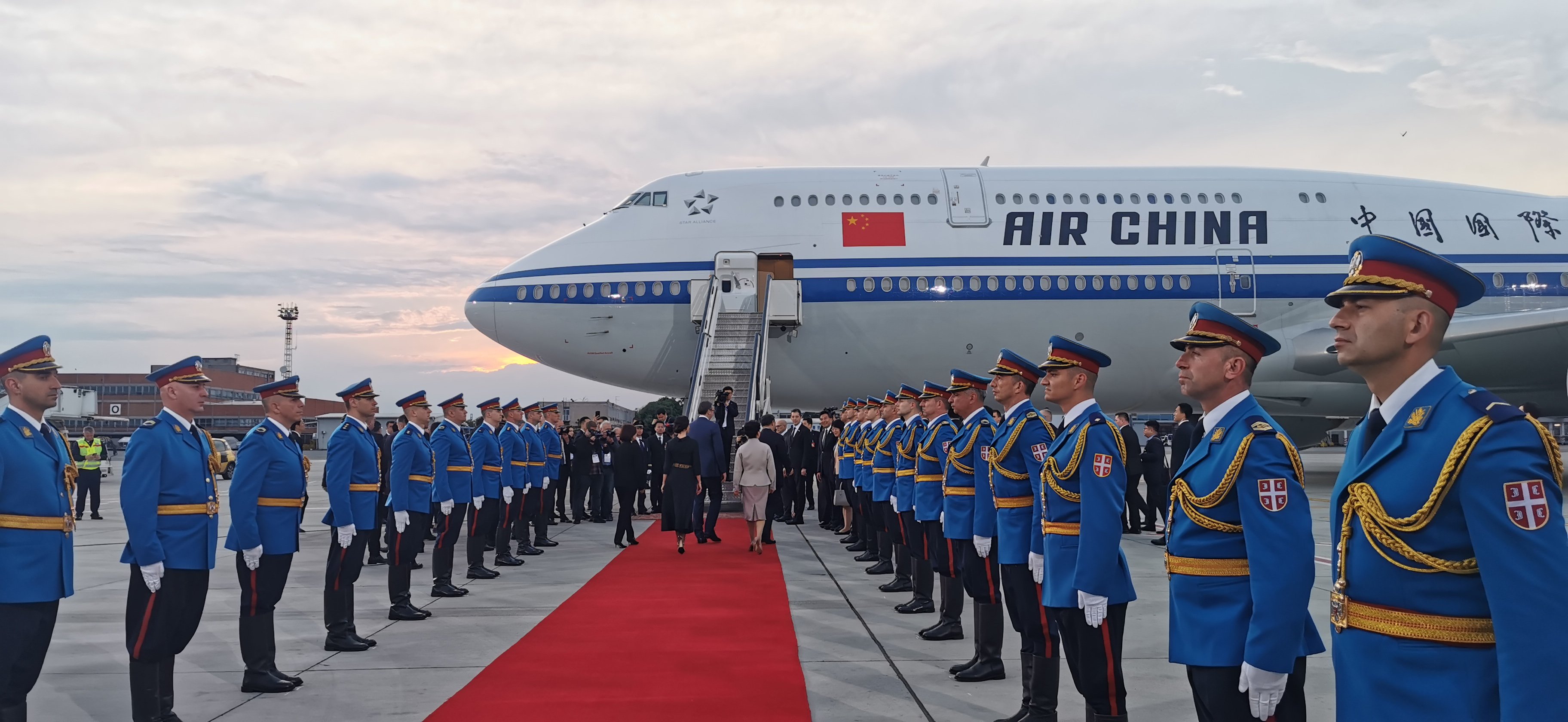In a symbolic display of friendship and diplomatic cooperation, Serbian MiG-29 fighter jets escorted Chinese President Xi Jinping’s plane as it departed Belgrade for Budapest, Hungary, on May 9.
The Chinese media released a video capturing the moment Serbian fighter jets took off to accompany President Xi Jinping’s aircraft as it started its journey towards the Hungarian capital.
President Xi Jinping’s visit to Serbia commenced on May 7, eliciting a warm reception from the Serbian populace, who turned out in large numbers, waving both Serbian and Chinese flags.
The Serbian Air Force deployed its MiG-29 fighter jets to escort President Xi Jinping’s plane upon entering Serbian airspace in a gesture of honor and respect befitting the distinguished guest.
During his stay, President Xi Jinping engaged in bilateral discussions with Serbian President Aleksandar Vucic, resulting in the signing of numerous agreements aimed at bolstering cooperation between the two nations.
These agreements follow the commemoration of the 25th anniversary of NATO’s bombing of the Chinese Embassy in Belgrade during the 1999 campaign to quell the ethnic conflict in Kosovo. The United States has since expressed regret for the bombing incident, acknowledging it as an error.
Experts view President Xi Jinping’s visit, coinciding with the anniversary of the embassy bombing, as a deliberate message amidst the ongoing conflict in Ukraine. By emphasizing China’s commitment to peace and stability, President Xi Jinping seeks to distinguish China’s foreign policy from that of the United States and NATO.
In an op-ed published in Serbia’s pro-government newspaper, Politika, President Xi Jinping stressed China’s dedication to peace, vowing never to allow a repeat of past tragedies.
The signing of a joint statement on the “shared future” between China and Serbia further solidifies the burgeoning alliance, surpassing the Comprehensive Strategic Partnership established in 2016.
President Xi Jinping’s diplomatic tour extended beyond Serbia. He visited Hungary, an EU member state and a key participant in China’s Belt and Road Initiative.
Both Serbia and Hungary share close ties with Russia, further aligning their strategic interests with China’s vision for regional cooperation and development. Before traveling to these two nations, President Xi commenced his five-day European tour by visiting France.
Key Takeaways From Xi’s European Tour
Chinese President Xi Jinping’s recent tour of Europe — starting from France, Serbia, and Hungary — underscored China’s emergence as a global power with an unwavering commitment to expanding its influence in the European continent.
While the visit covered various topics, from trade relations with the European Union to China’s stance on the conflict in Ukraine, its overarching message was clear: China, under Xi’s leadership, is a rising superpower whose presence in Europe is indelible.
The tour commenced with opulent receptions in Paris, where French President Emmanuel Macron sought to address European concerns regarding Ukraine and trade imbalances.
Despite Macron’s efforts to assert European positions, particularly on trade issues such as Chinese electric vehicles in the European market, Xi adeptly navigated discussions, deflecting concerns while capitalizing on perceived divisions within the EU.
Macron’s advocacy for European “strategic autonomy” inadvertently aligned with Xi’s vision for a multipolar world, further emphasizing China’s global ambitions.

Although concrete progress on economic issues remained elusive, Xi’s visit aimed to mitigate tensions and prevent further deterioration of Sino-European relations, which have been strained amid threats of tariffs and probes about Chinese subsidies.
In Belgrade and Budapest, Xi received grandiose receptions. On his part, the Chinese President signaled China’s strategic intent to deepen ties with these European countries. Strategic partnerships and investment agreements announced during the visits underscored China’s commitment to bolster its relevance in the region.
In Serbia, President Aleksandar Vucic embraced Xi’s vision of a “global community of shared future,” heralding an “ironclad partnership” between the two nations. Economic agreements, including activating a free trade deal and promises of enhanced air links and agricultural imports, solidified China’s foothold in the Serbian economy.
Similarly, in Budapest, Xi pledged substantial investments in transportation and energy infrastructure, including constructing a high-speed railway and cooperation in the nuclear sector.
The announcement of a $2.1 billion project to connect Budapest with Belgrade, financed primarily by a Chinese loan as part of the Belt and Road Initiative, exemplified China’s commitment to fostering connectivity and economic development in the region.
Xi Jinping’s European tour exemplified China’s assertive posture on the global stage, showcasing its ability to cultivate strategic partnerships and expand its sphere of influence in Europe.
- Contact the author at ashishmichel(at)gmail.com
- Follow EurAsian Times on Google News





